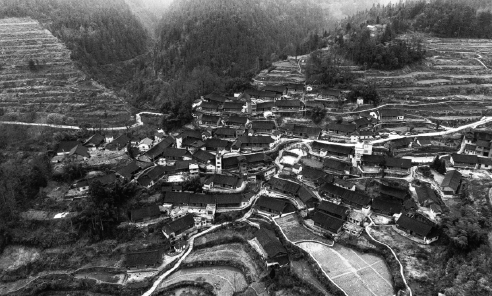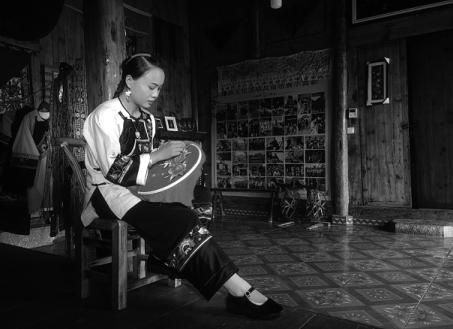CITADEL OF HOPE
A campaign to revive the fortunes of a remote village points the way to how to help those in need

If ever there were a place in China whose very existence seemed to be in question it was Shibadong village in mountainous Huayuan county of the Xiangxi Tujia-Miao autonomous prefecture in Hunan, much of its land inarable and its transport links poor.
The few things it did have going for it, such as its scenic beauty and its ethnic traditions, seemed destined to remain secrets largely known only to itself, meaning the village's 1,000 inhabitants were severely hampered in being able to make a living.
Thus it was that in Shibadong a government policy called targeted poverty alleviation was unveiled when President Xi Jinping visited the village on an inspection tour in November 2013. That policy includes harnessing the assets of such villages to eliminate poverty and keeping a track of individual households to ensure that the measures are working. In the ensuing six years it has had spectacular results, helping to put China on the verge of eliminating extreme poverty by the end of this year.
Those results can be seen in Shibadong, whose inhabitants are now enjoying newfound wealth, better living conditions and greater work opportunities. Ten years ago such villages tended to resemble retirement communities, almost all young people having moved to towns or cities where they could make a living. But that has started to change as young people, attracted by a quieter life and seeing the opportunities revitalized villages offer, opt to go and live in them. They in turn are doing their bit to make the villages wealthier and better places to live in.
One of those in Shibadong is Liu Su, whose pedigree and credentials could hardly be any more urban. He was born in the city of Changde in Hunan province, about 280 kilometers to the east, and he studied for a year in the US and for a doctorate at City University of Hong Kong.
After joining the Hunan provincial department of water resources in 2018 he was selected to work in the village as assistant to the village director, and now villagers know him fondly as Dr Liu.
While he is living apart from his wife and children at the moment-they live in Changsha-he says he needs no persuading to stay on in the village.
"I've just started working recently, and given that Shibadong village was where the government's targeted poverty alleviation policy was first adopted it's a unique place, and I feel really lucky to be here."
It is a great place to learn and gain experience at the grassroots level, he says, his many varied tasks as village director's assistant including to find out what villagers need and to develop its agricultural and tourist resources.
Liu came up with the idea of opening a restaurant that villagers would own and run, and this turned in a profit of 120,000 yuan ($17,068) from August to January, and created five stable jobs for villagers.
Travelers from around the world are now visiting the village, which has created demand for tour guides who can speak English, Liu says, so he set up a night school to teach English to the guides in the village.
The first course of English classes lasted six months, and Liu says he sensed that villagers became increasingly enthusiastic students. When the course ended, eager young villagers often approached Liu, anxious to know when the next course would begin.
In tackling poverty, Liu says, education is paramount.
"I realize that as an individual I don't have a lot of power to improve local education, but succeed or fail, I want to give it a go."
When Shi Zhichun returned to the village three years ago after university studies he returned as somewhat of a hero, the first villager to have gained a master's degree, in law at Jishou University in Hunan in 2017. In fact, it had been the village's connection with the targeted poverty alleviation policy that had inspired him to do his law degree, he says, and on his return he was determined to put his legal expertise to work for his fellow villagers.
"I decided to do law because our village is remote and villagers lack any legal awareness. I'd like to change their mindset and way of solving problems."
On his return he was pleased to see that tourism was being developed, but he felt that villagers remained stuck in the past in the way they did business.
"You would find elderly people sitting in a parking lot every day, even on cold, windy winter days eager to sell stuff, but selling hardly anything. I'd sometimes go up to them, have a bit of a chat and ask what the problem was."
Shi says he is well aware that many city dwellers would enthusiastically buy various kinds of fresh countryside food abundant in Shibadong village, but the elderly have no idea how to connect with potential customers.
To bridge the gap he opened an internet live streaming account and, with his hobbies of guitar playing and singing, he can help the villagers sell local products online.
Sometimes when the village holds an outdoor market he can be seen in front of a camera playing his guitar. All sorts of products are available on his channel, including chili, honey, kiwi fruit and homemade rice wine, in fact anything the villagers ask him to help with.
"Live streaming gives the village a lot of exposure," Shi says. "People outside have a place where they can buy the stuff they want, and the villagers, particularly the elderly, get a chance to sell their products."
He has also worked with public welfare organizations and his alma mater to host online and offline marketing campaigns.
The village has precious few university graduates, but two of them, Shi's cousin and niece, both of whom have professional experience in video making, have decided to join him in making short videos to publicize the village and its products.
He is keen to pursue a doctoral degree in order to provide a better platform for the villagers that can protect their interests.
In the days of Shibadong's great exodus as its young people headed for big cities to find work, those left behind, in addition to elderly people, were children, most left in the care of their grand parents.
One of them was Long Jinli, 21, who recalls that when she was small their house leaked when it rained, so living in a decent house with her parents became one of her childhood wishes. In fact it was more like a pipe dream, because visits by her parents were few and far between, largely because of the poor road access to the village.
Later, Long too would leave the village for a year to work in the cities, but her exile was short.
When the village's newly developed scenic areas needed tour guides, she answered the call, and she has worked as a guide in the village since.
On Long's social media, her life looks much like those of any other person of her age, taking selfies, going hiking, or simply making a dinner. What sets her apart is the exquisitely decorated Miao ethnic attire that figures prominently in her social media, proud manifestations of her ethnicity.
Growing up in the Miao ethnic group village she has been immersed in the culture and mastered Miao drumming, an art form that combines drumming with dancing, since she was about 5.
When she returned to the village she started learning Miao embroidery, which has been passed down from ancient times and was conventionally required of females. She is now also a member of the village's Miao embroidery cooperative, working to promote the traditional craft in exhibitions and through sales.
"Embroidery is an important element of the intangible cultural heritage of the Miao people," Long says of why she does Miao embroidery. "Especially now, the number of young people who master the craft is decreasing."
At the embroidery cooperative many members are young university graduates who chose to return to the village, or married women who used to work in cities, but like Long can support their families without being separated from them.
Long's parents also returned to the village recently. The family is now considering opening up its own bed and breakfast to share the happiness of their family reunion with the tourists.







Today's Top News
- Lawmakers review draft law to expand childcare services
- China's new-style tea brands find a hot new market in US
- Xi extends congratulations to Chilean president-elect
- Japan urged to stop provocative moves
- Shanxi ends province-wide blanket fireworks ban
- Tech park set to lift GBA's development






























